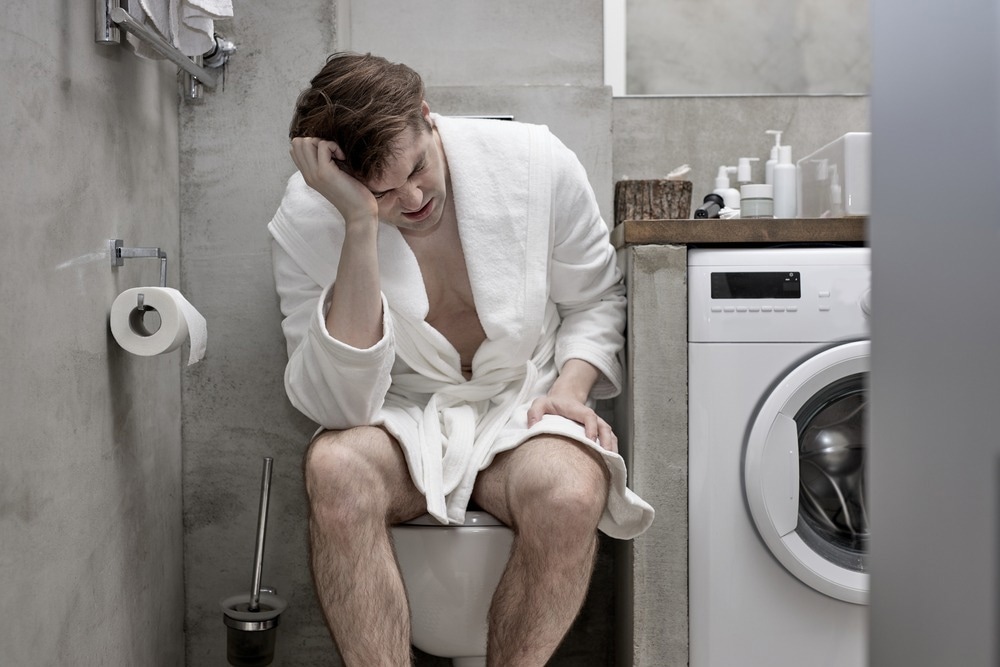Introduction
Symptoms of Urinary Difficulty
Causes of Urinary Difficulty
Management of Urinary Difficulty
References
Issues with urination in men may arise due to multiple factors. For instance, an enlarged prostate, mostly age-related (“benign prostatic hyperplasia”, BPH), can cause urine dribbling or a hesitant stream. In most cases, difficulty with urination develops insidiously and is noticed only when the individual finds it impossible to pass urine, causing the urinary bladder to swell and the person to feel discomfort.

Image Credit: Roman Chazov/Shutterstock.com
Symptoms of Urinary Difficulty
Men may present with urinary symptoms such as:
- dysuria, or pain before, during, or after the passage of urine
- urinary incontinence
- urinary urgency
- increased frequency of urination
- urinary hesitancy
- dribbling of urine
- urinary retention
- blood in the urine, or hematuria
- pain around the area of the urinary bladder or at the back
Causes of Urinary Difficulty
Many reasons may account for the difficulty in urinating among men. Prostatitis is one, being a painful inflammation of the prostate gland. This organ, present only in men, encircles the neck of the bladder, where the urethra begins. Its function is to contribute to the fluid component of semen.
Both acute and chronic prostatitis are known, the latter being more common than the former. Bacterial infection is the most frequently identified cause, mostly from the adjacent rectum. Prostatitis is more likely with bladder or other urinary tract infections or with injury to the perineum. Prostate enlargement is another risk factor, as is the instrumentation of the urethra.
Urinary hesitancy in older men could be due to BPH. BPH affects at least half of men over 50 years of age. In fact, 9 out of 10 men over 80 years have BPH. An enlarged prostate may block or squeeze the urethra.
This condition progresses over time and can cause other complications related to the urinary system, including urinary hesitancy, bladder damage, urinary infection, and kidney damage. Hesitancy includes dribbling urine, a weak urinary stream, and difficulty with beginning urination. This could lead to urinary retention, urgency of urination, making it difficult to hold urine back at inconvenient times, an overactive bladder, or having to get up from sleep to urinate.
Certain medications used for colds or allergies, drugs used to treat incontinence, and certain vitamins and minerals, can cause hesitancy of urination. Other causes include neurologic disorders, post-surgical complications, urethral strictures, and spastic pelvic floor muscles.
Some neurologic disorders that cause this condition include injury to the spinal cord, multiple sclerosis, brain tumors, cerebral palsy, stroke, and Parkinson’s disease. Bladder irritation due to infection, tumor, or stones in the bladder can also produce similar symptoms and difficulty in urination.
Urinary retention is predominantly seen in men, mostly due to obstruction of the urinary stream. In over half the cases, the blockage is due to BPH, with the others being accounted for by infectious, inflammatory, iatrogenic, or neurologic causes.
Bladder stones may form when urine is retained in the bladder over a long period. Sometimes they may cause hematuria, dysuria, weakened urinary stream, or abdominal pain.
Dysuria is present in many urologic conditions, including infection, inflammation of or near the urethra, obstruction of the urethra, cancers of the bladder, or bladder stones. Hematuria, or blood in the urine, may be caused by the above causes as well as pyelonephritis, disease or cancers of the kidneys, and trauma to the kidney or bladder.

Image Credit: Naumova Marina/Shutterstock.com
Management of Urinary Difficulty
Doctors use the International Prostate Symptom Score (IPSS) to evaluate the severity of symptoms.
BPH is diagnosed by physical and radiological evaluation. In most cases, it is managed with oral medications like 5-alpha-reductase inhibitors that reduce the prostatic volume or alpha-blockers that relax the prostatic and bladder neck musculature. Some men may need surgical intervention, including transurethral resection of the prostate (TURP), microwave ablation, needle ablation, or laser surgery.
Behavioral changes are very important, as they can prevent some bothersome symptoms. This includes using fluid restriction, training the bladder, and developing good bladder habits.
Bladder stones may be passed in the urine if they are very small, provided the patient drinks plenty of water. If they grow, they will need to be removed by open surgery or minimally invasive surgery (MIS) using endoscopy. Large stones are often broken up by laser or ultrasound energy or mechanically before removal, which eases the process.
Urinary retention should be treated by immediate catheterization to relieve bladder pressure, followed by management of the cause of retention where possible. Suprapubic catheters have been found to be more comfortable and safer for patients and need to be replaced less frequently.
Dysuria and hematuria must be evaluated to identify infection, inflammation, dietary causes, or the presence of bladder or prostate issues. These must be treated with attention to the underlying cause, accompanied by pain-relieving measures like drinking plenty of water, over-the-counter medications that reduce the pain and burning during urination, and avoiding risk factors such as taking tub baths, using tight underwear, and keeping away from alcohol, caffeine, and spicy foods until it clears up.
Since many symptoms relating to urination could be caused by prostate malignancy, a medical consultation is warranted to rule out this potentially serious condition. A blood test to measure prostate-specific antigen (PSA) levels may be ordered, which may indicate the need for further testing in some cases.
References:
Further Reading
Last Updated: Jul 11, 2022